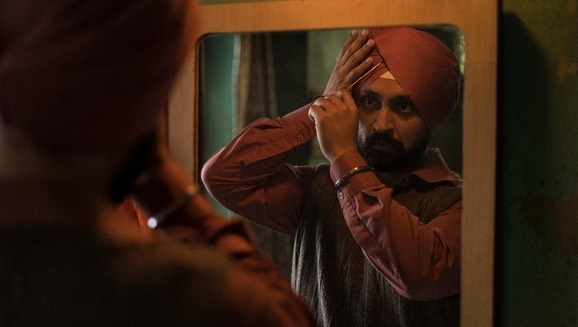Ali Abbas Zafar’s Jogi could have raised questions about political challenges that are still relevant, but it has its heart in the right place. The two-hour film is a fictional retelling of the targeted 1984 anti-Sikh riots in central Delhi, right after the assassination of then Prime Minister Indira Gandhi by her bodyguards.
The titular protagonist, played by the enigmatic Diljit Dosanjh, is your everyday man leading a normal life when he and his father are suddenly attacked in a bus by their co-passengers. When asked the reason for them getting attacked, he’s told it’s because he’s a “Sardar”. It doesn’t take him long to realise that his neighborhood is under attack — houses and shops are being burnt down, people are being shot dead. They run for cover, eventually managing to take their family and neighbours to the nearest Gurudwara for refuge.
This is where the goals for the film are set. Jogi must sacrifice his visible identity — he cuts his hair in a heartbreaking scene — to save the community of people by transporting them out of Delhi in a truck. His friends — police officer Rawinder (Mohd Zeeshan Ayyub) and transporter Kaleem (Paresh Pahuja) — help in executing the plan. At the heart of it, it’s a story of friendship between three men from different religious backgrounds who had the courage to stand up together for what’s right and take initiative.
Thus far, the film follows a classical hero’s journey. The hero turns from an ordinary person to a saviour and has a very clear goal in hand: get these people out of Delhi and ferry them to the neighbouring state of Punjab.
It is after this point that Jogi takes many turns — some needed, some not so much. The first half is packed with suspenseful scenes and is tonally focused despite operating within cliches. At the end of the midpoint, many of these people are safely transported to Punjab and Jogi is back in Delhi to figure out a plan for the rest of them. But because he makes mistakes during the first run that weren’t totally avoidable, the road to the finish line has gotten tougher. It’s in the second half where the script falters when the writing and the direction cannot keep up with the stakes set by the first half. It resorts to melodrama.
Diljit Dosanjh is perfect for the role and shines within the scope of the script. Even in his rage, there’s vulnerability; in his determination, there’s fear. Unlike the rest of the characters in the film, Diljit’s acting makes Jogi a three-dimensional character you can really empathise with. Kumud Mishra plays a politician we have seen time and again in films who wants to treat the lives of hundreds as a means to get his MP ticket. Kumud, too, gives a fine performance despite the character not having any depth.
However, it is Hitesh Tejwani, who plays the role of police officer and a friend-turned-foe to Jogi, who delivers beyond expectations. You almost feel bad for him. A better-written script and character could have made his role memorable and done justice to his skills. He says a lot even when saying very little. His restrained performance is in true contrast to Dosanjh, who quite literally has to keep running throughout the film and become larger than life to lead a community of people to safety. In the hands of a different director, this nuanced rivalry could have been executed well. But Ali Abbas resorts to the easy solution.
With just half an hour or so remaining in the film, and during a tense scene closer to the climax, the film cuts to a flashback. Yes, there’s a love story there, there is a song and finally there’s pain. We’re back from the tragic realities of the riot to make-believe Bollywood. In the flashback, the real reason as to why Tejwani’s Lali hates Dosanjh’s Jogi is revealed. Films with personal stakes in larger tragic events, work. In fact that is what adds a sense of personality and emotional depth to the story. But Jogi is a textbook example of how not to do it. As soon as the personal stakes of both Lali and Jogi are revealed in flashback, it’s resolved in the present, thanks to Jogi eloquently stating the obvious. This is lazy writing.
In the technical aspects, however, Jogi remains strong. The cinematography and sound bring out the horror of the past and make you feel you’re a part of the events. The background score for the most part is good but if you do find it familiar, it’s probably because you have listened to the soundtrack of Ludwig Goransson’s Tenet on loop. It’s glaringly similar in parts and very little effort has been made to hide it.
Despite its flaws, Jogi is an important film. In a world growing increasingly divided and where men are turned against one another in the name of religion and politics, it highlights the futility of it all. A lot can be debated around the need to fictionalise real-life tragic events and weighing them down with Bollywood tropes to tell a story. Jogi tries its best to be sincere and respect the sensitivity of the theme within that framework. I only wish the craft was as sincere.











